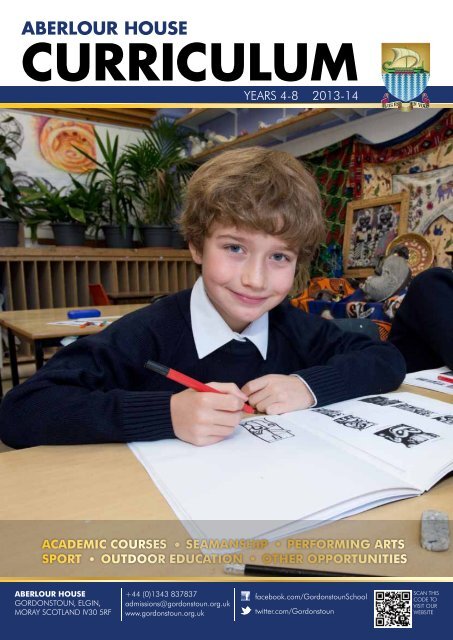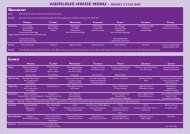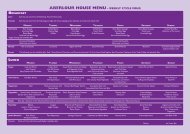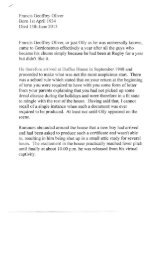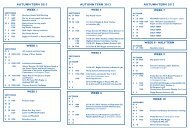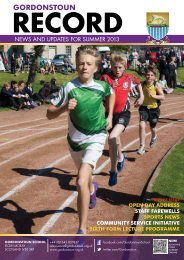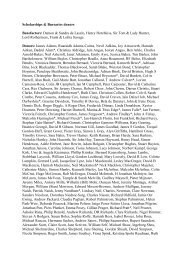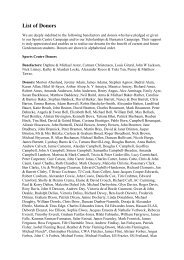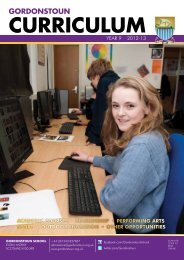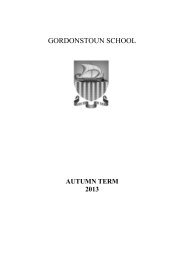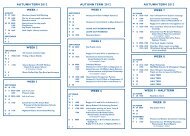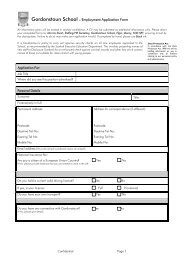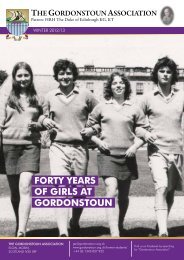Junior School Curriculum Handbook - Gordonstoun
Junior School Curriculum Handbook - Gordonstoun
Junior School Curriculum Handbook - Gordonstoun
- No tags were found...
Create successful ePaper yourself
Turn your PDF publications into a flip-book with our unique Google optimized e-Paper software.
ContentsYears 4-8 CURRICULUM 2013-14introduction 2subjects 3English 3Maths 4-5Science 5-6History 7-8Geography 9-10French 11-12Latin 13Religious Studies 13Drama 14-15Art 16-17Music 18-19International and Spiritual Citizenship 20-21Information and Communication Technology 21Design Technology 22Physical Education 22-23Outdoor Education 24Learning support and eal 25the next stage 25Life at the <strong>Junior</strong> <strong>School</strong> 26P
introductionthe academic programmeAberlour House has a very broad curriculum which allows eachchild to shine in many areas. The children are challenged andstretched in class to the best of their ability and the small class sizesallow them to have superb attention from their teachers. Theseare balanced for co-education as well as with boarders and daypupils alike. We believe that health and fitness are important forthe child’s ability to learn and so sport, PE and Outdoor Educationfeature prominently throughout the year. All children are impelledto experience time on the stage through music and drama. Thisin turn improves confidence which permeates all areas of theirlearning. Aberlour House has a nurturing family ethos where weaim to bring out the best in every child. Positive discipline andsupport from teachers and their fellow pupils encourages childrento do their best in all areas of the <strong>Curriculum</strong>. The following pagesoutline the programme of study for a <strong>Gordonstoun</strong> <strong>Junior</strong> <strong>School</strong>pupil.Page 2
subjectsthe academic programmeenglishYears 4, 5 and 6In the <strong>Junior</strong> Years, we focus on:• TalkingClass and group discussions, debating, presentations, etc• ListeningListening to and discussing stories, games, following instructions, etc• WritingHandwriting, extended writing, grammar, punctuation and structure.• ReadingStructured and independent reading including skills developmentusing a variety of genres.These skills are integrated into a meaningful curriculum, aimed atproducing individuals who are both confident and competent inthe English Language. We continually assess these skills, ensuringprogression at an individual level.Years 7 and 8The Year 7 and 8 English scheme follows the National <strong>Curriculum</strong>,Key Stage 3 and the Common Entrance syllabus. We aim toencourage fluency, competence, confidence and enjoyment inspeaking, listening, reading and writing. Oral work becomes anintegral element for written work.A variety of different texts are covered with each year group,including poetry, prose, plays and factual material. Diverse forms ofwriting are studied in order to foster an awareness of appropriatestyles, content and register, for varying purposes and audiences.Work is always differentiated in order to take into account theindividual needs of pupils.The English course is designed to provide a base for continuingthe study of language and literature and encourages independentstudy and learning, including the use of the library, reference books,the Internet and ICT facilities. The pupils have access to wirelesslaptop computers, which are frequently used during the lessons andorganised prep periods in the evenings.Page 3
SubjectsthE academic programmemathematics Years 4, 5 and 6In the <strong>Junior</strong> Years, we follow the Abacus scheme with the focusbeing on consolidation of the basic skills of addition, subtraction,multiplication and division .We aim to develop a sound understanding and familiarity with theseprocesses as a basis for further maths work in later years. We recognisethe importance of a varied approach and use a combination of oral,written and practical learning strategies.The following topics are covered during the course of Years 4-6,progressing from basic to more complex computation, skills andunderstanding:• Number• Money• Measures• Shape & Space• Data Handling• Problem SolvingAt Aberlour House we recognise that each child develops individuallyso all planning and assessment is differentiated according to eachchild. We use a balance of formative and summative assessment tomonitor their progress and ensure that their needs are being met.Our aim is to ensure that pupils move into the senior end of theschool feeling well-prepared and confident in their mathematicalability.Year 7In Year 7 pupils start work on Key Stage 3 of the National <strong>Curriculum</strong>,revising Level 4 then working mainly at Level 5. The CommonEntrance syllabus is also followed in preparation for the final examsin Year 8. Pupils build on the skills that they have developed in KeyStage 2 and increasingly make connections between different aspectsof mathematics.Topics covered include arithmetic (including fractions, decimals andpercentages), basic algebra, properties of shapes, data handling andproblem solving.continued../Year 8Page 4
Subjectsthe academic programmemathematicscontinuedYear 8During this year pupils continue to follow Key Stage 3 of the National<strong>Curriculum</strong>. Topics are centred at level 5 and 6 with some elementsof Level 7. There is also consolidation of the Common Entrancesyllabus leading to exams in June with pupils sitting scholarship inFebruary following an accelerated course. Candidates should workwith increasing confidence and flexibility to solve unfamiliar problems,including word problems.Pupils are assessed in June in the following ways:(i) oral paper(ii) two written papers, one with calculators and one without.Scientific calculators are required during Year 8. To facilitate themove to senior school we would recommend that calculators have a‘fraction’ facility as well as standard trigonometric functions and aresolar powered.scienceIn the <strong>Junior</strong> Years, we follow the English National <strong>Curriculum</strong>,integrating a balance of basic Physics, Biology and Chemistry withinthe following topics:Year 4 Year 5Moving and GrowingKeeping HealthyKeeping Warm and Cool Earth, Sun and MoonSolids and LiquidsChanging SoundsSimple Electricitygases around usFrictionChanging StateHabitatsLife CyclesYear 6Forces in ActionHow We See ThingsChanging CircuitsMore about DissolvingReversible and Irreversible ChangesInterdependence and AdaptationMicro-organismsAt the <strong>Junior</strong> end of the school, the emphasis is very much onpractical and investigative learning. We aim to stimulate and fosteran enjoyment and sound understanding in science. Pupils arecontinually assessed through oral, practical and written work whichis differentiated according to the needs of the individual pupil.continued.../Years 7 and 8Page 5
Subjectsthe academic programmesciencecontinuedYears 7 and 8In Years 7 and 8, all pupils study a balance of the sciences. This istaught in the three subject areas of Biology, Chemistry and Physics.The pupils follow the Independent <strong>School</strong>s’ Common EntranceSyllabus which is very close to the Key Stage 3 programme ofstudy with a view to taking Scholarship or Common EntranceExaminations during Year 8.The principal aim at this early stage is to stimulate an interesting,and enjoyment of science and its everyday applications. Work inthe classroom is firmly based upon experiments, demonstrationsand investigations. The use of IT resources is also integrated intothe teaching. There is much discussion, and pupils are encouragedto express themselves freely so that they may learn to do so simplyand clearly. Most pupils will have studied science before, althoughperhaps not in such a structured way. However, this is not assumed,and care is taken where appropriate to make provision for thosewhose experience is different.Year 7The following topics are covered:Cells: The Body’s Building BricksReproductionEnvironment and Feeding RelationshipsVariation and ClassificationAcids and AlkalisSimple Chemical ReactionsParticle Model: Solids Liquids and GasesSolutionsEnergy ResourcesElectrical CircuitsForces and their EffectsThe Solar System and BeyondYear 8The following topics are covered:Plants and PhotosynthesisEcology, studying in particular the Life of the SalmonFood and DigestionRespirationMicrobes and DiseaseAtoms and ElementsCompounds and MixturesRocks and Weathering, Heating and CoolingMagnets and ElectromagnetsLightSound and HearingElectricityPage 6
Subjectsthe year 9 academic programmehistoryYear 4Autumn TermLocal History: Aberlour House and <strong>Gordonstoun</strong> - The children lookat the history of Aberlour House and <strong>Gordonstoun</strong> and developtheir skills in historical interpretation and enquiry by studying oldphotographs and buildings.Spring TermAncient Egypt - The children study life in ancient Egypt and thinkabout how archaeological remains can help us find out about thepast, how people lived and what they believed.Summer TermThe Ancient Greeks - The children study life in ancient Greece andhow ideas from that time have influenced us today.Year 5: Invaders and SettlersAutumn Term and into Spring TermThe Celts and the Romans in Britain - The children study how theCeltic people came to Britain and their way of life. They also look atthe impact of the Roman invasion and how we can find out aboutthe Romans by looking at archaeological and written evidence.Spring Term and Summer TermThe Picts and the Vikings - The children study the archaeologicalevidence left by the Pictish people. This includes a visit to BurgheadPictish fort. They then look at the Viking invasion and again thearchaeological evidence left behind that helps us to understandhow they lived.Year 6Autumn TermScotland at the time of Wallace and Bruce - The children lookat why this period of history was so unsettled by conflict and inparticular the roles played by William Wallace and Robert theBruce.Spring TermThe Aztecs - The children study archaeological and written evidenceto find out about how the Aztecs lived and what they have leftbehind.Summer TermWorld War II - The children look at why the Second World Warstarted and what life was like for children living at the time. Thisincludes learning about the Blitz, evacuation and rationing.continued.../Year 7Page 7
Subjectsthe year 9 academic programmehistorycontinuedYear 7In Year 7, pupils follow the Common Entrance syllabus for historywhich is based on Key Stage 3 of the English National <strong>Curriculum</strong>.Greater emphasis is put upon developing essay writing skills andreading and interpreting historical sources in preparation for theCommon Entrance exam.Medieval Realms: 1066 - 1500During the Autumn Term, the children learn about the NormanConquest. This includes the Battle of Hastings, the Feudal System,the Domesday Book and castle building. In the Spring Term, theymove onto looking at religious life during the Middle Ages. Thisincludes studying medieval religious beliefs, the lives of monks andnuns, conflicts between Church and King as well as the Crusades.During the Summer Term, the children cover the Barons’ Revolt andthe Magna Carta, life in a medieval town and village, the BlackDeath, the Peasants’ Revolt and the Wars of the Roses.Year 8In Year 8, pupils continue to follow the Common Entrance syllabusbased on Key Stage 3 of the English National <strong>Curriculum</strong>.Greater emphasis is put upon developing essay writing skills andreading and interpreting historical sources in preparation for theCommon Entrance exam.The Common Entrance exam is taken in June (with the Scholarshipexam being taken earlier in the year in February). Pupils answerquestions based on historical sources and write an essay.The Making of the United Kingdom: 1500 - 1750This year’s work covers the Tudors and Stuarts. In the AutumnTerm, the children look at the religious beliefs of Catholics andProtestants and how their churches differ. They then study why HenryVIII made himself Head of the Church in England and closed downthe monasteries. They look briefly at the religious views of EdwardVI and Mary, before moving onto the reign of Elizabeth I. Topicscovered over the remainder of the term and into the Spring Termare Elizabeth’s religious changes, Mary Queen of Scots, the SpanishArmada and the Elizabethan Poor Law. In the Summer Term, thechildren look at the Stuart monarchs, starting with James I and theGunpowder Plot, Charles I and the English Civil War and finally theGreat Fire of London.Page 8
Subjectsthe academic programmegeographyIn the <strong>Junior</strong> Years (Years 4, 5 and 6) we focus on themes selectedfrom the English National <strong>Curriculum</strong> and the Scottish 5-14<strong>Curriculum</strong>.In Years 7 and 8, the children follow the Common EntranceGeography syllabus. This includes atlas skills, Ordnance Surveymapwork, thematic and case studies, fieldwork and enquiry skills.Year 4Year 5Year 6• Natural Disasters - earthquakes, volcanoes, extremeweather, avalanches... etc.• Improving The Environment - resources, litter / pollution,recycling, saving energy.• Life in an LEDC - life in the countryside, life in the city(Case study from Asia e.g. India or South America e.g.Brazil).• Locational Knowledge - Scotland - towns and cities,transport, upland areas, sea areas, islands, rivers.• Geography in the News - topical items of a Geographicalnature, as and when they occur.• Water - distribution and use, water supply, drought anddry environments, flooding and wet environments, waterquality and pollution.• Transport - networks, types of transport, road traffic, trafficproblems and solutions.• Coasts - coastal processes and landforms, coastalsettlements (transport, industry, tourism).• Locational Knowledge - United Kingdom - countries,towns and cities, transport, upland areas, sea areas,islands, rivers.• Geography in the News - topical items of a Geographicalnature, as and when they occur.• Rivers - hydrological cycle, source to mouth, rivers andpeople, case studies of European rivers.• Cities - growth and history, capital cities (London casestudy), rural - urban migration, cities in LEDC’s.• Mountains - relief maps, mountain formation, mountainsand the weather, case studies (e.g. Scotland, Himalayas)• Locational Knowledge - Europe - countries, capital cities,transport, upland areas, sea areas, islands, rivers.• Geography in the News - topical items of a Geographicalnature, as and when they occur.continued.../Year 7Page 9
subjectsthe academic programmegeographycontinuedYear 7ISEB Common Entrance SyllabusYear 8• Tectonic Processes - Earth structure, plate movements,earthquakes and volcanoes. Case studies selected fromboth MEDCs and LEDCs.• Settlements - site, shape, size, functions, shops andservices, patterns in cities. Case studies from the UK and acontrasting LEDC.• Weather and Climate - measuring, recording andforecasting weather, the water cycle, types of rainfall,weather and climate in the British Isles, microclimates.• Mapwork Skills - grid references, distance and scale,directions, symbols, height.• Locational Knowledge - continents, seas and oceans,lines of latitude and longitude, islands, countries, cities,mountain ranges, rivers, deserts, volcanoes.ISEB Common Entrance Syllabus• Coursework - based upon fieldwork studies in the localarea.• Geomorphological Processes - weathering and erosion,changing coastlines and coastal landforms, rivers, riverlandforms and flooding.• Economic Activities - sectors of industry, resources,locations, industrial change. Case studies from local areaand the UK.• Environmental Issues - ecosystems (Amazonia case study),protecting rural environments, National Parks in the UK.• Examination Preparation - revision, exam technique andpast paper questions.Page 10
subjectsthe academic programmefrench French is taught by Aberlour House teachers in Years 4 and 5,with the emphasis on learning vocabulary, enjoyment and oncommunicating through oral work, so that students acquire thecorrect sounds.From Year 6, French is taught by language specialists from<strong>Gordonstoun</strong>. While continuing to emphasise oral and listeningwork, more time is spent progressively on understanding grammar,on reading texts and on writing correctly. The aim is for a smoothtransition through Aberlour House into the French classes in thesenior school.Year 4• Basic personal information• Days of the week, months of the year, times.• Numbers• Family and Pets• WeatherThe emphasis is on oral work to learn vocabulary, using games andsongs to re-enforce new concepts.Worksheets are used for consolidation and differentiationYear 5• Revision of basic personal information• Days of the week, months of the year, times.• Numbers up to 100• Revision of family and pets• Weather• Sports• Colours• The BodyThe emphasis is still on oral work, using games and songs to reenforcenew concepts.Worksheets are used for consolidation and differentiation.Year 6The vocabulary covered in Years 4 and 5 is re-enforced to allowstudents who have just joined the school to learn the basic wordslearned in Years 4 and 5.continued.../Year 6Page 11
subjectsacademic programmefrenchcontinuedAlso covered are:• Seasons• Genders of nouns (le / la un / une)• How adjectives change• Classroom vocabulary• <strong>School</strong> subjects• Expressing basic opinions• Telling the timeMore emphasis is now placed on the spelling of words andunderstanding why words change their spelling.Year 7A textbook is now used so that the senior Aberlour curriculummeshes with the work covered in <strong>Gordonstoun</strong>. At present, thecourse is based around “Equipe Nouvelle 1”.The first part of the year is spent re-enforcing the work covered inprevious years so that the many students who enter Aberlour in Year7 can acquire a basic knowledge of French quickly to join with theothers.While the emphasis is still on enjoyment, on communication and onusing a variety of activities, some more serious grammar learning isundertaken, for example the declining of adjectives, understandingverb patterns in the present tense and some irregular verbs. Greateremphasis is placed on extended written work.Extension work is carried out on the topic of school. New topicscovered include Free Time and Hobbies, Food and Drink and AtHomeYear 8The students in Year 8 continue to use “Equipe Nouvelle 1” andthen work through as much as possible of “Equipe Nouvelle 2”.The main aim is to have covered as much ground as possible sothat the Aberlour students are in the highest sets possible for Frenchin Year 9 at <strong>Gordonstoun</strong>. Students sit the CE Listening, Readingand Writing exams and have an oral exam with a member of theGodonstoun staff to assess their level on entry to the senior school.Topics covered include• The past and future tenses• Extension work on home area• Daily routine• Clothes and fashion• Opinions and justification• Health• TV and cinemaPage 12
subjectsacademic programmelatinYear 8Students beginning Latin in Year 8 can expect to be taken throughUnit 1 of the Cambridge Latin Course. Basic grammatical structuresand forms are covered, and practice is given at reading andtranslating Latin. Students who have studied Latin before are givenmaterial appropriate to their experience.The study of Latin promotes both linguistic skill and culturalawareness. Background areas covered include life in Pompeii, theeruption of Vesuvius and Ovid’s Metamorphoses. At the very end ofthe year a start is made to the study of Classical Greek.religious studies Year 4During one lesson a week, the pupils are introduced to the greatJudaeo-Christian stories from the Old and New Testaments. The aimis to create a sense of awe and wonder and allow them to exploretheir own spirituality through these two great religious traditions.Year 5During one lesson a week, the pupils complete a course called Signsand Symbols which seeks to give them an understanding of thepractices and procedures of the Christian Church.Year 6During one lesson a week, the pupils become eyewitness reportersto the events that took place in Mark’s Gospel. As they encounterpeople who met Christ, they build up a picture of this great spiritualleader.Year 7During one lesson a week, this year group study the six major worldfaiths. Using the Encyclopaedia of World Religions and backed upwith Channel 4’s World Faiths series they learn the bare basics ofeach religion in the hope that they will learn respect for and anunderstanding of where people with different faiths are coming from.Year 8A short Revision Crash Course in preparation for the importantCommon Entrance Examination at the end of the year. Thisconcentrates on doing practice papers along with examinationtechnique.Page 13
subjectsacademic programmedramaYears 7 and 8Drama and Theatre Studies is a very successful subject in<strong>Gordonstoun</strong> and has some very well established roots in Aberlour.The experience gained here is designed to support the confidenceof all students and contribute to their team-building skills later onin school life, whether applied in a performance context, or, morelikely, on a day to day basis.Years 7 & 8 have one session of Drama per week, which lastsapproximately one and a half hours. The overall structure of thesesessions is as follows:• Register and introduction to the plan (a calm and focused5 minutes)• Warm-up games• One or two exercises, using drama skills which link with...• Drama tasks with a specific focus, theme or issuefor the session which may (but not always) lead to…• A show and share section, with review• Wind-down gameThe work of both year groups explores facial expression, bodylanguage, and vocal quality. It aims to build awareness of all theseelements, then experiment with detail, leading to different styles ofcharacterisation.Year 7Taught for approximately half of the school year, starting mid-November and ending at the Easter Break, Drama is delivered tothe whole year group, by two specialist teachers.Focus is on communication and control.Sessions include:• Mime• Freeze-frames• Mask• Spot-lightAreas of exploration include:• Trapped!• The Elevator• In The Hospitalcontinued.../Year 8Page 14
subjectsadademic curriculumdramacontinuedYear 8Half of the Year group are taught Drama by two specialist teachers,whilst the other half has Dance lessons for the Autumn term. Theythen swap for Spring Term. In the Summer Term, the skills learnt arecombined into a cross-creative experience!Focus is on group-skills, concentration, and imagination.Sessions include:• Improvisation• Thought corridor• Role-play• Interview• Hot-seatingAreas of exploration include:• Bullying• The Restaurant• At the AirportAll students participate fully, and are encouraged to comment oneach others’ work in a positive, constructive and creative manner.Drama ProductionsYear 4, 5 and 6 all have a performance on stage in the ChristmasShow in the Autumn Term. All of Years 7 and 8 perform drama onstage at the end of the Spring Term.Page 15
subjectsacademic curriculumart<strong>Curriculum</strong> OverviewYear 4autumnspringsummerTitleFocusContentTitleFocusContentTitleFocusContentWeird and WonderfulMonster Book illustrationResearching and creating ideas for monstersMaking an illustrated book coverFruit SaladMaking a 3-D bowlExperimentation from fruit imagesDecorative bowl constructionHarbour LifeRecording from real lifeVisit to harbour and experimentationMixed media paintingYear FiveautumnspringsummerTitleFocusContentTitleFocusContentTitleFocusContentAnimal MagicExperimentation with shapeResponding to animals in art from othertimesMaking a class totemSewing the SeaSeascapesRecording from real life seascapesExperimenting with textiles techniquesPatterns in NatureRepeat patternsExperimenting with mediaMaking repeat printed patternsYear 6autumnspringsummerTitleFocusContentTitleFocusContentTitleFocusContentKlimt PatternsPattern-making and colourMixed media experimentationDesigning a decorative textile pieceTotally TowersDecoratve ceramic clockResponding to world architectureMaking a ceramic decorative towerGo Fish!Recording as illustrationObservatoin studies of fish and seafoodPoster makingcontinued.../Year 7Page 16
Subjectsacademic curriculumArtcontinuedYear 7autumnspringsummerTitleFocusContentTitleFocusContentTitleFocusContentMaking Your MarkReal-life artist interpretationsExperimental mark-makingDiagnostic drawing courseBreaking Up the LandscapeLandscapeInvestigating colour and ImpressionismThree-part landscape in mixed mediaSymbols and StoriesNarrative in ArtSymbols and stories in Aboriginal artSymbolic representation of life storyYear 8autumnspringsummerTitleFocusContentTitleFocusContentTitleFocusContentThe Machine AgeStill life and abstractionDrawing from a still life arrangementMaking a clas abstract relief muralTrail MakingPhotographing and recordingRecording a journey from lifeProducing a photo-montageMe, Myself and IPortraiture in the 20th CenturyDrawing facesThe Fauvist and Expressionist portraitAll Aberlour students follow a course in Art aimed at stimulatingcuriosity, interest and enjoyment in the subject. They are introducedto Art and Design from different times and places and areencouraged to develop an appreciation for the visual and tactileworld.The students are provided with opportunities to use a wide range ofmaterials and techniques including painting, ICT, printing, graphics,textiles, digital photography and ceramics. They are also guided todevelop personal ideas within the themes by noting their thoughtsand feelings.Students complete three projects every year and are assessed at theend of each, gathering their work in a portfolio and sketchbook torepresent their progress.Page 17
subjectsacademic curriculummusiccontinuedSchemes of WorkThe schemes of work come from four broad subject areas:Year 7• Western Classical Music (1600 - 1899)• Western 20th Century Music (1900 - present day)• Popular Music• World Music• Voices in Layers (Performing)• Introduction to Notation and Elements of Music (Theory)• Gamelan - Music of Indonesia: Java and Bali(Performing/Composing )• The Graphic score and Experimental Music (Composing)• Samba Band - Brazilian Percussion ensemble (Performing)• Folk Music (Performing)• Examining the West End Musical (Performing)• Variation Form (Performing and Composing)• Classical Sonata Form (Performing)Year 8• Ragtime - Music of Scott Joplin (Performing)• 12 bar Blues (Performing/Composing through improvisation)• Jazz (Performing/Composition)• Programme Music (Listening and Appraising)• Reggae (Performing and Composition)• African/Egyptian Drumming (Performing/Composing)• Popular Song of 1960 - 1990 (Performing/Composing)• Film Music (Composition)• Indian Music (Performing/Composing)Aberlour House Extra Curricular Activities• <strong>Junior</strong> Choir/Senior Choir• <strong>School</strong> Orchestra/String Orchestra/Brass Ensembles/Wind Band• Recorder Group/Scottish Pipe Band/Guitar EnsembleBoth formal and informal concerts are arranged throughout the yearand children also perform in weekly services. These activities help togive them the confidence they require to perform in public, which willbe an invaluable asset during their school and working lives.Page 19
subjectsacademic curriculuminternational and spiritualcitizenshipYears 6, 7 and 8In Years 6, 7 and 8, PSE is covered by a wide ranging mixture ofactivities designed to positively involve all the pupils to work withtheir own experiences. Use is made of drama, role-play and multimedia,as well as more formal class activities and discussions. Byits very nature, the precise subject content is tailored to the needs ofthe individual class but each year’s course covers learning objectivesdesigned to:1. Develop confidence and responsibility while making the most ofthe children’s abilities.2. Prepare the pupils to play an active role as citizens.3. Build an awareness of how to develop a healthy, safer lifestyle.4. Make informed choices.5. Show how to develop good relationships and respectdifferences between people.The subjects covered in each year are specified in more detail below.Year 61. Recognise their worth as individuals by identifying positive thingsabout themselves and their achievements, seeing their mistakes,making amends and setting personal goals.2. Identify the range of jobs carried out by people they know andto understand how they can develop skills to make their owncontribution in the future.3. To begin to develop an understanding of how to look aftermoney and realise that future wants and needs may be metthrough saving.4. Why and how rules and laws are made and enforced, whydifferent rules are needed in different situations and how to takepart in making and changing rules.5. To realise the consequences of anti-social and aggressivebehaviour, such as bullying and racism, on individuals andcommunities.6. Learn about how the body changes as they approach puberty.Year 71. Reflect on and assess their strengths in relation to personality,work and leisure.2. Recognise how others see them and give and receiveconstructive feedback.continued.../3. RecognisePage 20
subjectsacademic curriculuminternational and spiritualcitizenship (continued)Year 73. Recognise the emotions associated with change caused byseparation and new family members, and how to deal positivelywith their feelings.4. Understand the physical and emotional changes that take placeat puberty.5. Within the context of relationships, learn about reproduction andcontraception.6. Understand that good relationships and a balance betweenwork, leisure and exercise can promote physical and mentalhealth.7. Develop an awareness of differing cultural norms within oursociety.Year 81. Empathise with the differences between people, understandingthe effects of stereotyping, prejudice and discrimination.2. Recognise the emotions caused by death and divorce and howto deal with them.3. Consider emotional and physical health. Begin to learn aboutsexual relationships.4. Recognise pressures which threaten personal safety, includingabusing alcohol and using illicit substances. Learning how toresist and get help.information andCommunication technologyYears 4 - 8At Aberlour house, our aim is for students to develop ICT skills,which they can use to enhance their learning in all areas of thecurriculum and to encourage them to reflect on the application ofInformation and Communication Technology in everyday life.The ICT provision is extensive, with two suites of wireless, Internetlinked laptop computers. This provides tremendous scope for subjectteachers to use ICT within their own subjects.Each class receives one formal ICT lesson each week, following theQCA Key Stage 2 and 3 Schemes of Work. Touch-typing instructionis an integral part of each scheme.All pupils are given their own e-mail addresses and both daystudents and boarders are given access to the computers during theirfree time, with appropriate supervision.Page 21
subjectsacademic curriculumdesign technology Year 7Students start their experience in Design and Technology withmotivational projects of a lower skill level. They all makeelectronically and pneumatically controlled buggies that they racein knock out competitions for prizes. The second half of the year isaimed at improving basic accuracy in wood, metal and plastic withsome computer aided design skills.Year 8Pupils tackle one project in Year 8, the making of a steady handtester. They make small boxes with some electronics to test theirnerve on a <strong>Gordonstoun</strong> styled design. The project is designed tobe completed by all, to introduce simple electronics and improveaccuracy of making in wood and metal.physical educationPhysical Education at Aberlour House and <strong>Gordonstoun</strong>, is aboutdeveloping each individual to achieve his or her potential. Weprovide a broad range of opportunities for all of our pupils to fullyrealise their physical skills and abilities. We allow our studentsto build their understanding and experience of teamwork andleadership skills, as well as their broader social skills. Furthermore,we aim to foster a love of sport that will allow each individual tocontinue to participate long after leaving school.All Aberlour students attend one double period of Physical Educationeach week. They are taught in mixed ability, mixed gender groups ofapproximately up to twelve students. Lessons are taught by specialistPE staff. The aims of the Physical Education course are:• To develop a range of skills and increase the confidence ofthe pupils in a number of activities.• To introduce the principles of adopting and maintaining ahealthy lifestyle. To teach the skills required to achieve thisand to understand the effect of exercise on the body.• To develop an understanding of the need to preparetheir bodies for exercise, how to achieve this and then torecover from exercise.continued.../To providePage 22
subjectsacademic curriculumphysical education(continued)• To provide the opportunities to plan and evaluate theirown performances and that of others. Additionally, thepupils are encouraged to begin to think about the tacticsand strategies required to outwit opponents in differentsituations. There is particular reference to team play andthe individual’s role within teams leading to co-operativeactivities as well as competitive ones.• To provide a challenging and enjoyable experience,which allows all students to achieve their potential andto learn the social benefits of active participation insporting activities. The aims of the PE curriculum are metthrough a structured, progressive programme that includesthe following activities: gymnastics, dance, athletics,swimming, cross country running and games. Theseinclude tennis, volleyball, hockey, basketball and netball.Games ProgrammeThroughout the year we offer a full and varied games programmeto all pupils at Aberlour House. Games sessions are one hour induration and take place on four days during the week.Autumn TermBoys: Rugby, Football, HockeyGirls: Netball, HockeySpring TermBoys: Hockey, Cross-Country Running, Football (Seniors),Rugby (<strong>Junior</strong>s)Girls: Hockey, NetballSummer TermBoys: Cricket, Athletics, TennisGirls: Rounders, Athletics, Tennis(In each case above, the sport named first is the principal sport during that term).In addition to the sports named above, all pupils also havetraining in various Outdoor Education Activities as part of a rollingprogramme (e.g. kayaking, canoeing, climbing, expedition training).Pupils may also opt to take lessons in Judo, Karate and Horse Ridingduring <strong>School</strong> games sessions.Matches are played against other schools and sports clubs in thelocal area and further a field. These fixtures are usually arranged forWednesday afternoons and Saturday mornings.Page 23
subjectsacademic curriculumoutdoor educationYears 4 - 8Outdoor Education is an integral part of the Aberlour House<strong>Curriculum</strong>, from Year 4 to Year 8. All pupils take part in climbing,canoeing and kayaking sessions, as part of the weekly gamesprogramme, during the Autumn and Summer Terms. OutdoorEducation and Survival are often offered as ‘Projects’, one afternooneach week.During the Spring Term, the majority of pupils opt to take part inthe weekly skiing sessions at The Lecht, snow permitting. Teams areentered into the Scottish Prep <strong>School</strong>s Ski Championships and TheScottish Minors Race.During the Summer Term, each year group takes part in anexpedition, of three to five days duration.Years 4 and 5The pupils in Years 4 and 5 take part in mixed outdoor activities/ field studies experience, based at a local outdoor centre.Considerable emphasis is placed on team building and developingself confidence.Year 6In Year 6, the pupils go on a camping expedition (base camp),and take part in a range of outdoor activities and initiative / teambuilding exercises.Year 7The Year 7 pupils travel through The Great Glen, by canoe andsleep under canvas.Year 8After sitting their Common Entrance exams, Year 8 take part in awilderness expedition, exploring some of Scotland’s remotest areas.This continues a long tradition of wild camping and adventurouschallenge in the children’s final year at Aberlour House.Final-year pupils at Aberlour House also have the opportunity tospend a weekend on <strong>Gordonstoun</strong>’s sail training vessel, Ocean Spiritof Moray.Page 24
learning supportlearning support & EALlearning supportAberlour House has an experienced Learning Support Departmentwhich ensures that children with specific learning difficulties aresupported. This support may be in-class, small group teaching or1:1 tuition. Assessments may be carried out at Aberlour House todetermine the appropriate support needed to equip children withthe necessary skills to develop their learning. Learning Support staffliaise with parents and other members of staff should there be anyconcerns.english as anadditional languageAberlour House welcomes international students, believing thatthey bring a richness and variety of experience to our schoolcommunity. Staff and pupils are able to draw on the expert EALdepartment at <strong>Gordonstoun</strong> which ensures that pupils, whose firstlanguage is not English, are fully provided for. All pupils are fullyscreened on arrival.the next stageprogress to senior schoolMost boys and girls who come to Aberlour House will progress to<strong>Gordonstoun</strong>. However we warmly welcome children whose parentsmay not be certain about the future and do not wish to make along-term commitment, or who plan to move elsewhere after <strong>Junior</strong><strong>School</strong>.We carry out <strong>Junior</strong> <strong>School</strong> assessments in conjunction with the Senior<strong>School</strong>.This means that parents can assume that their children, onceaccepted, can move seamlessly to the Senior <strong>School</strong>. Students whointend doing so must, however, take an examination, based on theCommon Entrance Examination. This both keeps students up to themark and helps to place them in the Senior <strong>School</strong>.Page 25
life at the junior schoolby parents and pupils“I have never come across such a warm and nurturing environmentin a school. As a result, my daughter felt instantly ‘at home’ and hasflourished.”I love coming to school because of the friendly atmosphere and thegreat opportunities.Luisa, Year 6“I have two children at Aberlour, one in Year 4 and one in Year 6,and both have improved and “come out of themselves”tremendously since being here. The range of activities that theythrow themselves into is fantastic and they both love coming toschool.”I love reading stories and doing my reading homework. We havelots of amazing books in the classrrom and in the library. I get lotsof Flights (House) points for my good reading!Will, Year 4“Our son has flourished since joining Aberlour House. He has nevershown an interest in music, however is now a keen trombone playerand, having started the chanter a year ago, is looking forward toplaying the bagpipes. He is growing into a mature, confident, kindyoung man.”I like the teachers, the lessons are fun and I really like the activities.Katy, Year 5“From the first day my daughter joined Aberlour House, and stillto this day, she comes home full of enthusiasm and joy abouteverything she has done each day. I feel the school encouragesand deevelops the children into polite, confident and well-roundedhuman beings. I am very happy to see my child so happy.”I enjoy spending time with my friends and learning English(Carolina); I enjoy the sports, expeditions and the practical lessons(Matilda); I love the skiing - it’s great fun! (Hamish P); Everyone isso kind (Hamish T).Year 7 pupilsPage 26
Aberlour HouseCURRICULUM 2013-14


